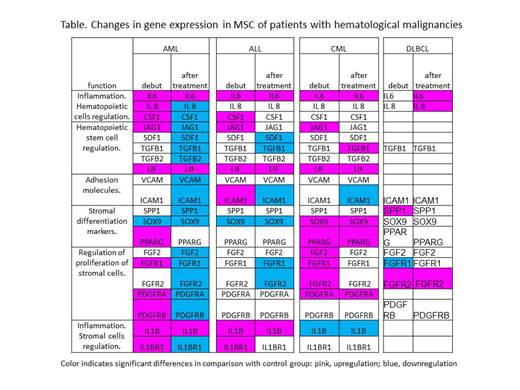Introduction. Stromal microenvironment of the bone marrow (BM) is essential for normal hematopoiesis; the very same cells are involved in the interaction with the leukemic stem cells. The aim of the study was to reveal the alterations in stromal microenvironment of patients in debut and after the therapy using multipotent mesenchymal stromal cells (MSC) as a model.
Methods. MSC of patients with acute myeloid leukemia (AML, N=32), acute lymphoblastic leukemia (ALL, N=20), chronic myeloid leukemia (CML, N=19), and diffuse large B-cell lymphoma without BM involvement (DLBCL, N=17) were isolated by standard method from the patients' BM. Each BM sample was acquired during diagnostic aspiration after the informed signed consent was obtained from the patient. Groups of BM donors comparable by age and gender were used as controls for each nosology. Gene expression was analyzed with real-time RT-PCR. The significance of differences was evaluated with Mann-Whitney U-test.
Results. The results of gene expression analysis are summarized in Table. The expression of genes regulating hematopoietic stem and precursor cells (JAG1, LIF, IL6) was significantly upregulated in MSC of the patients in debut, except for DLBCL. The latter was characterized with upregulation of osteogenic marker gene SPP1 and downregulation of FGFR1 gene. The upregulation of the expression of genes regulating proliferation of stromal cells (PDGFRA, FGFR1) and adipogenic marker gene (PPARG) was common for AML and CML. Both acute leukemias were characterized by the upregulation of genes associated with inflammation and regulation of hematopoietic precursors (CSF1, IL1B, IL1BR1) and by the downregulation of chondrogenic differentiation marker gene (SOX9). CML and DLBCL demonstrated the upregulation of FGFR2. BM of the DLBCL patients did not contain any malignant cells; nevertheless, stromal precursors from the BM were significantly affected. This indicates the distant effects of DLBCL malignant cells on the patients' BM. Myeloid malignancies seem to affect MSC more profoundly then lymphoid ones. Effect of leukemic cells on stromal microenvironment in case of myeloid leukemia was more pronounced.
The treatment significantly affected gene expression in MSC of patients. In all studied nosologies the IL6 gene expression was upregulated, which may reflect the inflammation processes ongoing in the organism. The expression of LIF was upregulated and ICAM1, downregulated in MSCs of AML, ALL, and CML patients. In the MSC of patients with AML, who had received the highest doses of cytostatic drugs to achieve remission, a significant decrease in the expression of most studied genes was found. In patients with ALL with long-term continuing treatment in combination with lower doses of drugs, IL1B expression was increased, while the decrease in expression was detected for a number of genes regulating hematopoietic stem cells (SDF1, TGFB1), differentiation and proliferation (SOX9, FGFR1, FGFR2). Treatment of CML patients is based on tyrosine kinase inhibitors in doses designed for long-term use, and is less damaging for MSC. The upregulation of TGFB1, SOX9, PDGFRA genes and downregulation of IL1B gene was revealed. MCS of DLBCL patients, unlike the other samples, were analyzed after the end of treatment. Nevertheless, significant upregulation of IL8 and FGFR2 genes was found. Thus, both the malignant cells and chemotherapy affect stromal precursor cells. The changes are not transient; they are preserved for a few months at least. MSCs comprise only a minor subpopulation in the BM in vivo. When expanded in vitro, they demonstrate significant changes between groups of patients and healthy donors.
Conclusions. Leukemia cells adapt the stromal microenvironment. With different leukemia, the same changes are observed in the expression of genes in MSC. MSC of patients with acute forms have a lot of changes which coincide among these two diseases. MSC of AML patients are most affected both in debut and after the therapy. Treatment depends on the nosology and in varying degrees changes the MSC.
This work was supported by the Russian Foundation for Basic Research, project no. 17-00-00170.
Chelysheva:Novartis: Consultancy, Honoraria; Fusion Pharma: Consultancy. Shukhov:Novartis: Consultancy; Pfizer: Consultancy. Turkina:Bristol Myers Squibb: Consultancy; Novartis: Consultancy, Speakers Bureau; Pfizer: Consultancy; Novartis: Consultancy, Speakers Bureau; fusion pharma: Consultancy.
Author notes
Asterisk with author names denotes non-ASH members.


This feature is available to Subscribers Only
Sign In or Create an Account Close Modal